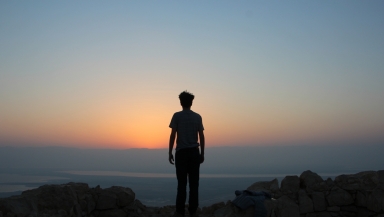
Jewish academic and Hebrew scholar Irene Lancaster reflects on Deuteronomy and the significance for the Israelites of entering the Promised Land.
The Jewish community have now entered a new phase in the calendar, with the Book of Deuteronomy read at Shul, followed by the Fast of the 9<sup>th of the month of Av. In Hebrew, this book is known as Devarim, meaning words or things. And in fact these are no longer the words of G-d via Moses that speak, but rather the words of Moses himself.
Moses will not himself enter the Promised Land, but he knows that the moment has now arrived when the Children of Israel will have to leave the relative comfort of life in the desert with him as leader and mouth-piece for G-d, for the tricky task of negotiating life in the real world, so to speak.
The Jewish sages refer to the 5<sup>th Book of Devarim as Mishne Torah, a repetition or review of the Torah itself. Since the commandments were given earlier, at Sinai, or at the Tent of Meeting, during the first year after the Exodus from Egypt, how were the narratives and commandments of Devarim chosen?
Rabbi Samson Raphael Hirsch (Germany 1808-88) explains that Devarim is Israel's Introduction to the new life they would be making for themselves in Eretz Israel. Once they crossed the River Jordan, they would no longer experience G-d's presence and daily miracles, as they had in the wilderness. They would have to become far more pro-active themselves. They would have to plough, plant and harvest. They would have to establish law courts and a government, and provide for and protect the poor and the helpless.
In order to do all this, as well as avoid the snares and customs of their idolatrous neighbours and false prophets, they would need backbone, faith and self-discipline. This is why the Book of Devarim encourages the people to be strong. So the fifth Book is not simply a repetition of what has gone before, but includes a large number of new laws.
The Vilna Gaon (Lithuania 1720-97) states the situation as follows:
'The first four books [of the Torah] were heard directly from the Holy One, Blessed is He, through the throat of Moses. Not so Devarim. Israel heard the words of this Book the same way they heard the words of the prophets who came after Moses. The Holy One, Blessed is He, would speak to the prophet today and on a later day he would go and make the vision known to Israel. Accordingly, at the time the prophet spoke to the people, the word of G-d had already been removed from him. So too, the Book of Devarim was heard in the mouth of Moses himself.'
In Devarim, Moses chose the words and conveyed the commandments as he understood them. Devarim began as the Oral Law conveyed by Moses, and then when G-d commanded Moses to inscribe his words in the Torah, it became part of the Written Torah. This is why Moses is known in Hebrew as 'rabbenu, 'our teacher.' For not only was Moses the conduit through which G-d's words were transmitted verbatim to Israel, he was also the teacher who explained these words.
This is why teachers are probably the most revered people in Judaism. Greater than priests, prophets, political pundits, judges, or monarchs, the 'teacher' is the Jewish leader par excellence, and in this, Judaism is unique. At a pinch the Jewish people have learned to do without priests, prophets and monarchs.
As for political pundits and judges, many are simply 'here today and gone tomorrow'. But teachers are people who continuously learn and then give over what they have learned. Is there any other religion in which the handing down of religious knowledge gleaned from continuous education is esteemed so greatly? As it states in the very popular Mishnah Pirke Avot, for example, 'Make yourself a teacher, and get yourself a friend.' (Chapter 1, v 6).
In other words, you yourself have to be active in finding the right teacher. Mere obedience is not the Jewish way. But a true teacher is a friend indeed, as the Mishnah so rightly states.
This time of year when we start reading the new Book of Devarim always falls in the month of Av, best known for the most mournful day in the Jewish calendar, the Fast of the 9<sup>th of Av. This is when we fast all day and read the Book of Eichah (Lamentations), seated on the ground or on low stools. So many tragic events took place at this time of year, including the destruction of the First Temple by Babylon in 586 BCE, and the Second Temple by the Romans in 70 CE. In addition, we have the expulsion of the Jews of Spain in 1492 and the start of World War One in 1914, to mention but a few.
This is also, as we have seen from the news, often an unbearably hot and arid time of year, when activity isn't possible and lassitude takes hold.
Maybe this is to remind us that entering the Promised Land is not a bed of roses after all, and we have much to contemplate. Not for us the dash to possession, but the careful and often impossibly tragic dilemmas which await in an arid country surrounded by outer enemies and inner pitfalls . And yet, this poignant period in the Jewish calendar will eventually lead to another Jewish New Year, and the start of the new cycle of 'In the beginning....'
For as it states in the accompanying Haftorah for Devarim (Isaiah 1: 1-27) 'Even if your sins are like scarlet, they will become as white as snow; if they have reddened like crimson, they will become like wool. If you show willing and listen, you will partake of the goodness of the land' (verses 18 and 19).
So even the most negative of predictions ends on a positive note, and that is how we feel at the end of the Fast of Av, chastened, but uplifted and ready to start anew.













